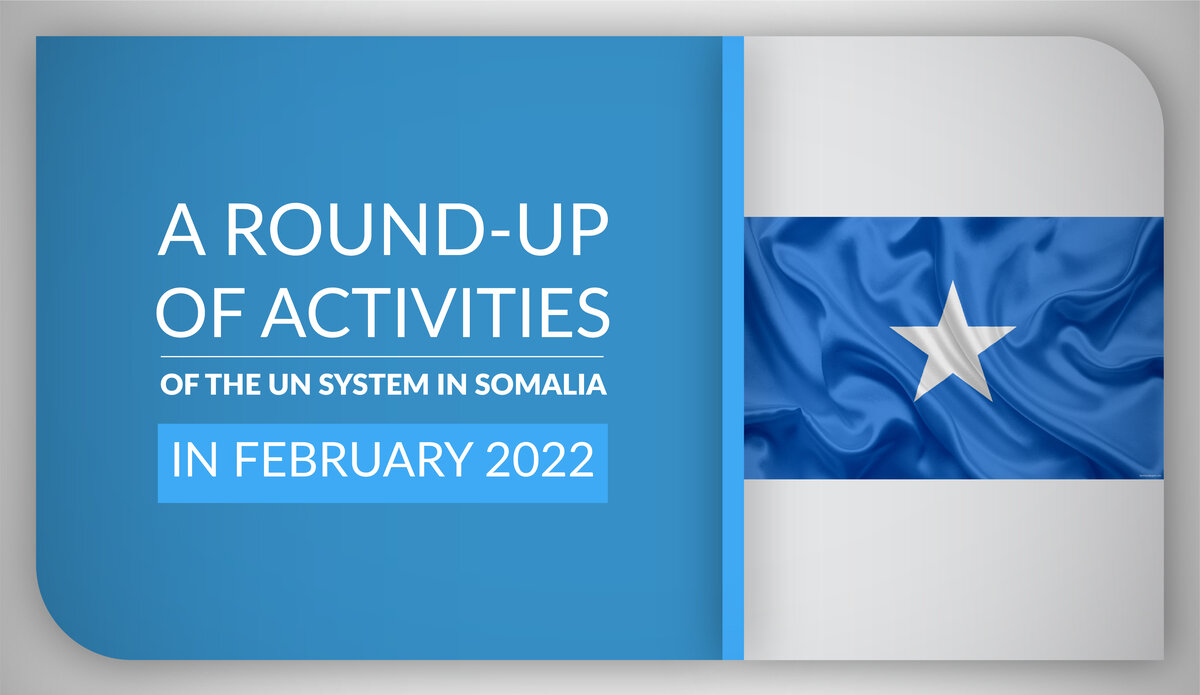A round-up of activities of the UN system in Somalia in February 2022
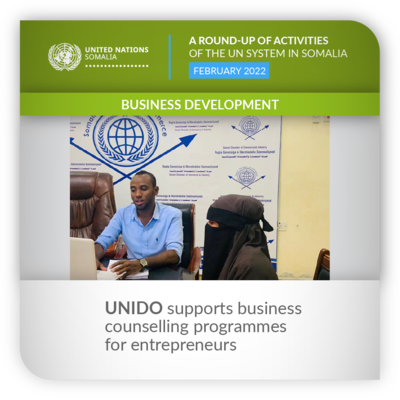 |
Business Development | UNIDO supports business counselling programmes for entrepreneurs By the end of the month, UNIDO had helped train more than 30 Somali business counsellors to offer one-on-one counselling services for entrepreneurs across the country. The training ultimately empowers the entrepreneurs to sustain their goals and profitability, access new technologies, improve marketing plans and management skills, find solutions to business problems, generate business ideas and gain access to information on financing in Somalia. The advisory service is part of UNIDO’s initiative to grow Somalia’s productive sector through the “Agrotechnology development for economic growth in South and Central Somalia” project, funded by the Italian Agency for Development Cooperation. It is offered through the network of Enterprise Development Units established with the Chambers of Commerce and Industry across the country. Since its inception, the service has supported more than 100 entrepreneurs and business owners to start, rehabilitate, and upgrade agro-industrial operations in Somalia. |
|
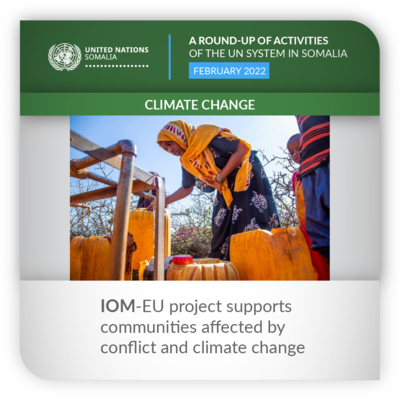 |
Climate Change | IOM-EU project supports communities affected by conflict and climate change IOM signed a new agreement with the European Union for a project to help populations in Galmudug adapt to climate change while addressing conflict arising from competition over increasingly-scarce resources. Signed in January, the IOM-EU project aims to provide lasting solutions to build the resilience of Somali communities, promote peace and prepare them against climatic shocks. It will also bring stability in an area where communities have historically confronted one another for control over diminishing natural resources. |
|
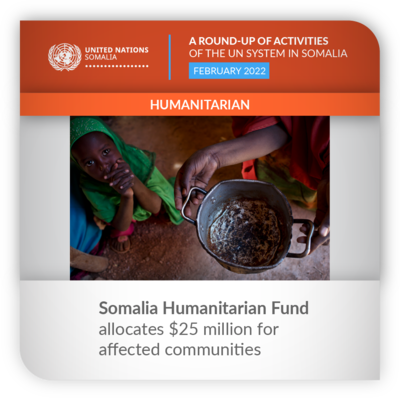 |
Humanitarian | Somalia Humanitarian Fund allocates $25 million for affected communities The Somalia Humanitarian Fund (SHF) made an early allocation of $25 million to provide immediate support to communities critically-affected by the country’s drought in key hotspot locations, particularly in under-served and hard-to-reach areas. This allocation complements the recent grant allocation of $17 million from the UN Central Emergency Response Fund (CERF). The new SHF donation comes at a time when recurring shocks have deepened poverty, compounded pre-existing vulnerabilities, and stripped communities of their livelihoods. Among the first sources of funding this year, this allocation will likely catalyse additional resources and early action for those most affected by the drought. The SHF is a multi-donor, country-based pooled mechanism created in 2010 to allocate funding for the country’s most urgent life-saving interventions. The Humanitarian Coordinator for Somalia decides on SHF allocations based on strategic priorities. On a day-to-day basis, the SHF is managed by the UN Office for the Coordination of Humanitarian Affairs (OCHA). |
|
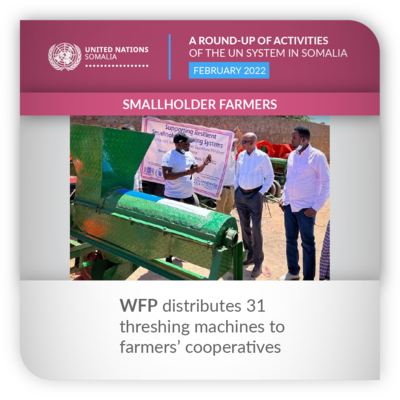 |
Smallholder Farmers | WFP distributes 31 threshing machines to farmers’ cooperatives WFP distributed 31 threshing machines to 24 farmers’ cooperatives in Belet Weyne and Jowhar, in Somalia’s Hirshabelle State, enabling them to save time, increase productivity, and reduce grain damage and spillage, while also reducing labour costs in threshing – the action of separating edible cereal grains from stalks and chaff. The farmers were immediately able to use the new equipment to start threshing newly harvested maize and sorghum. All the new threshing machines are now in full operation. The threshing machine distribution is part of a broader joint WFP and FAO project aimed at strengthening the resilience of smallholder farmers, supported by the Swedish International Development Agency. This distribution aligns with the project objective of improving post-harvest practices by reducing food losses and ensuring that smallholder farmers have more high-quality food available for consumption or sale, helping to strengthen their resilience against shocks. |
|
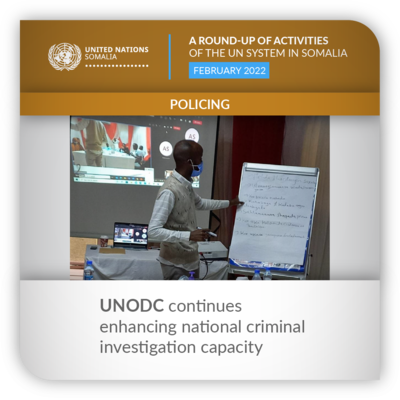 |
Policing | UNODC continues enhancing national criminal investigation capacity UNODC continued to support the Somali Federal Police with enhancing its criminal investigation capacity to combat crime. Through its Investigator Development Pathway (IDP), the UN agency helps with training for police investigators and prosecutors to effectively respond to criminal matters, including, and especially, transnational organized crime – in this instance, via the Online Investigator Development Course 1 (IDC1). The IDC1 is a ten-day course delivered as part of the IDP training under UNODC’s Criminal Investigation Programme in Somalia. Throughout February, the UNODC central training team offered IDC1 training in Kismayo, Baidoa, Dhusamarreb and Jowhar. A total of 41 participants, including 28 investigators and four prosecutors, completed the course. |
|
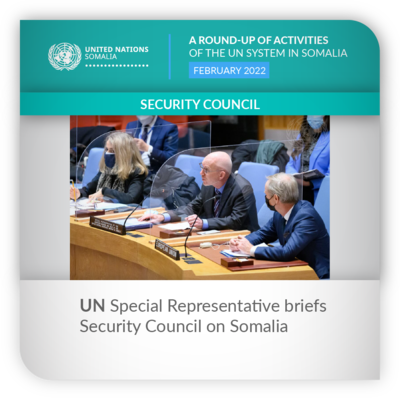 |
Security Council | UN Special Representative briefs Security Council on Somalia The UN Secretary-General’s Special Representative for Somalia, James Swan, briefed the UN Security Council on Somalia’s political, humanitarian and security situation. Mr. Swan welcomed progress made in the electoral process and called for Somali leaders to redouble their efforts to achieve the 30 per cent women quota in the House of Parliament elections. He also spoke of the UN’s efforts to engage all parties to address their political differences through dialogue, compromise, and pragmatic consensus-based solutions; and he urged Somalia's leaders to put aside differences for the good of all Somalis, conclude credible elections, and refocus efforts on broader national priorities such as security, state-building, and development. The UN official also told Council members that the humanitarian situation in Somalia remains extremely dire and called on donors to increase their support for urgent assistance to the most vulnerable Somalis. |
|
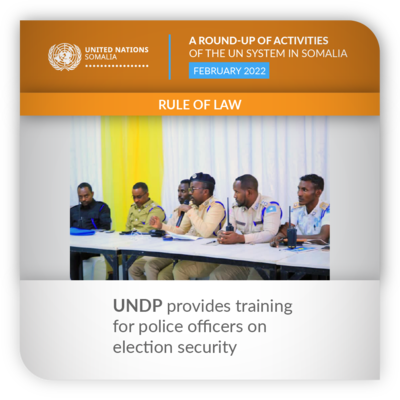 |
Rule of Law | UNDP provides training for police officers on election security UNDP provided training in Galmudug to more than 70 police officers and station commanders on public order management and election security. The training was part of a wider programme that has seen more than 480 police trained across all of Somalia’s Federal Members States and Banadir since 2021. |
|
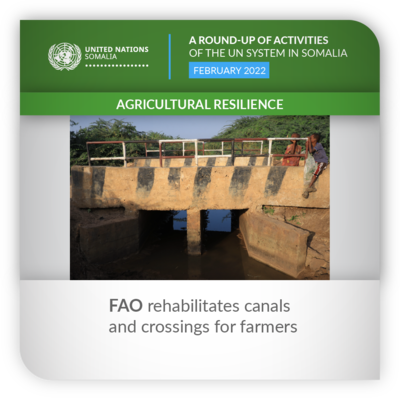 |
Agricultural Resilience | FAO rehabilitates canals and crossings for farmers FAO rehabilitated canals and crossings to help farmers in southern Somalia overcome water shortages and challenges in accessing markets. With funding from the European Union and through local implementing partners, FAO's project – the Pro-resilience Action (ProAct) – provided agro-pastoralists in Marka, in the Lower Shabelle region, with irrigation services, training in good agricultural practices, and better access to markets through the rehabilitation of bridges and walkways across the many waterways in the region. The UN agency’s approach to the rehabilitation is centred on the view that strong agri-food systems need viable linkages between producers and markets, so by improving access to water and reducing the barriers between communities and markets for farmers the local economy can better withstand future shocks such as drought and floods, as well as other challenges such as non-functioning irrigation infrastructure, widespread insecurity, and access issues. |
|
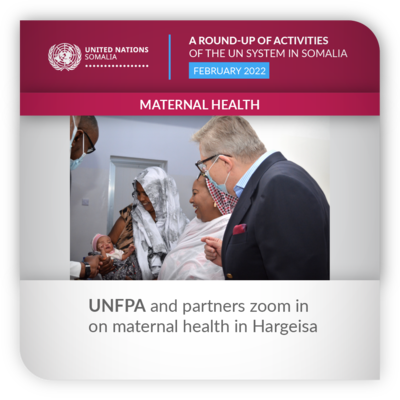 |
Maternal Health | UNFPA, donors and partners zoom in on maternal health in Hargeisa UNFPA and Somaliland’s Director-General of Health hosted senior Finnish representatives at the Hargeisa Group Hospital. The visitors’ activities included a review of service delivery and other efforts made since the hospital’s Maternity Department underwent renovation works last year with support from UNFPA, donors and the Somaliland Government. The Hargeisa Group Hospital is also a teaching hospital, where UNFPA-supported midwife students undergo their practical training. UNFPA visited the Hargeisa School of Health Sciences and met the students selected from 50 regions and hard-to-reach areas across Somaliland. Through engagement with governments, health experts and civil society, UNFPA works to improve the availability of essential medicines and reproductive health services of Somalis, strengthen their health systems, and promote international maternal health standards. |
|
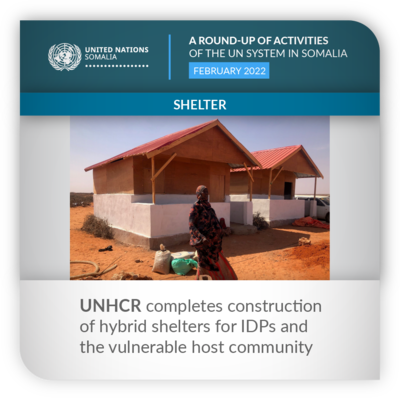 |
Shelter | UNHCR completes construction of hybrid shelters for IDPs and vulnerable host community Through its partner, the Norwegian Refugee Council, UNHCR completed the construction of 40 hybrid shelters and latrines for 40 households in Galkayo. The construction of the shelters was through an owner-driven approach, with the project’s beneficiaries leading the construction process of their own homes, with the ultimate aim of allowing the vulnerable community to have access to secure settlements where they can live in dignity and improve their quality of life. |
 UN
UN
